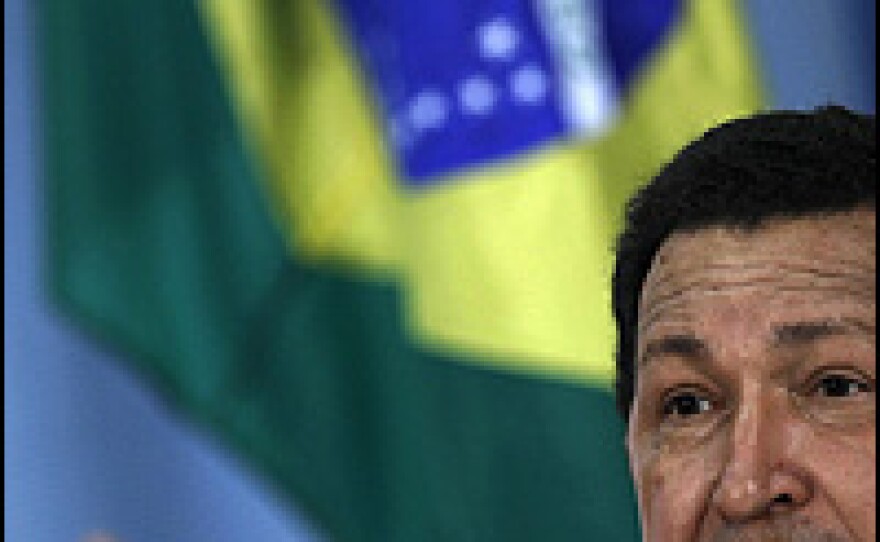
One world leader is taking some satisfaction in the turmoil on Wall Street. Venezuelan President Hugo Chavez said Tuesday that this week's meltdown shows the free-market approach long promoted by the United States as a model for the world has, in his words, "collapsed."
Chavez may be overstating his case, but the current financial crisis may cause some to rethink the free-market gospel, especially in Latin America.
In Venezuela, Chavez has nationalized oil, telephone and electric companies. In Bolivia, President Evo Morales took control of natural gas reserves. And in Ecuador, President Rafael Correa just won a referendum that will give him more control over his country's economy.
David Rothkopf, who headed the International Trade Administration under President Clinton, says all three Latin American presidents can now cite U.S. government intervention in the economy to justify their policies.
"And you know, in the past, the United States has been able to say, well you know, 'Don't do that, look at how prosperous we are, and we would never do that.' But in the wake of the effective nationalization of Fannie Mae, Freddie Mac, AIG, we have now intervened more in our financial markets than a lot of those countries have," he says.
The policies pursued by Chavez in Venezuela have discouraged private investment and may yet prove disastrous. But other Latin governments that have taken more moderate steps away from free-market orthodoxy are doing relatively well.
Brazil, Chile and Ecuador experienced sharp financial crises in the 1980s and '90s, and in response, they implemented policies to bring more stability to their economies. Some free-market ideologues criticized them.
But Nancy Birdsall, president of the Center for Global Development, says those governments were acting wisely.
"They did stick with more emphasis on regulation as a result of being burned during the crises of the '80s and the '90s," she says. "So they learned the lesson that both the markets and the regulatory authorities in the U.S. had not learned in the past 30, 40, 50 years." The lesson being that markets left entirely on their own don't always work in a country's best interests.
For years, mainstream economists have argued that governments in developing countries should respect markets, avoid overspending and follow prudent monetary policies. It was sometimes called the "Washington consensus," because it reflected the advice of the International Monetary Fund.
Speaking in Brazil, Chavez said the United States' new willingness to abandon free-market principles shows that the "Washington consensus" has collapsed. But the man who came up with that term, John Williamson, says it's an extreme version of that ideology — he calls it "market fundamentalism" — that has been discredited.
"I wasn't talking about market fundamentalism when I coined the phrase 'Washington consensus.' I was talking about something much more general," he says.
Perhaps the best example of a Latin American country departing from free-market fundamentalism is Chile, which in the late 1990s instituted a requirement that foreigners investing in the country had to leave their money there for at least a year.
But the United States made Chile drop that requirement as part of a free-trade pact, and Chile agreed. Williamson, now at the Institute for International Economics, says the United States should not pressure countries in that way.
"That seems to me most undesirable," he says. "I thought the sort of capital control one had in Chile in the 1990s was just right."
Birdsall says the current crisis in global financial markets shows the Chileans were onto something in the 1990s with their efforts to control capital movements in and out of their country.
"To the extent the Chileans weren't already vindicated, they certainly are now," she says.
Rothkopf, author of Superclass: The Global Power Elite and the World They Are Making, says the global financial crisis may mark a "watershed" in economic philosophy: the end of 25 years of "Reagan-Thatcherism" — the idea that governments should just stay out of economic affairs.
"I think it's quite possible that over the next 25 years, the prescriptions for reform you see are going to have a bigger government component, perhaps a bigger regulatory component on the global stage, as opposed to the national stage," he says.
That could also mean less economic preaching from the United States in Latin America and elsewhere, and maybe more attention to other governments' ideas.
Copyright 2022 NPR. To see more, visit https://www.npr.org. 9(MDAzMjM2NDYzMDEyMzc1Njk5NjAxNzY3OQ001))






